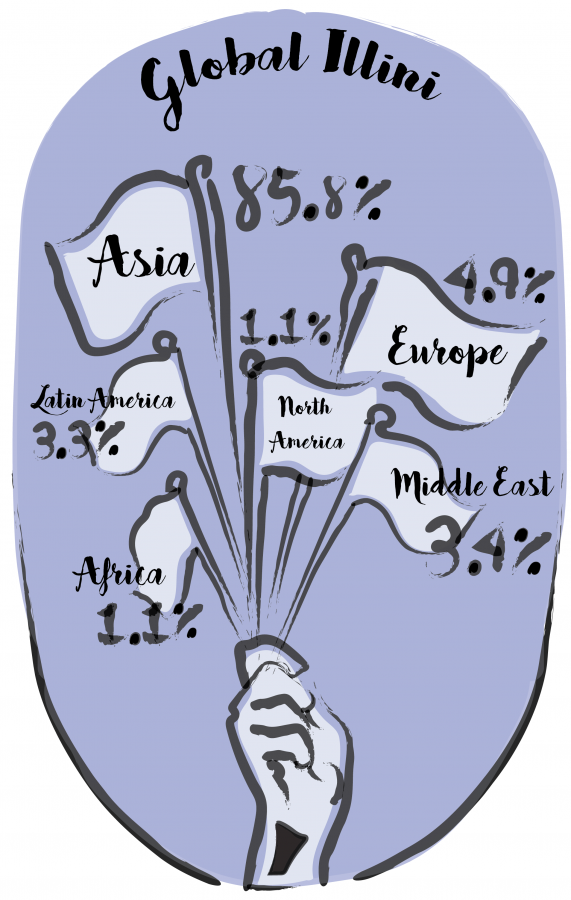The American Dream not always a reality
October 13, 2016
As an 8-year-old growing up in India, Anuja Harlalka watched shows like “Friends” and dreamed of coming to America. Now, as a senior in Business with graduation fast approaching, she is forced to confront the reality of her career dreams in a way her friends don’t have to.
If she cannot obtain an H-1B work visa, she will not be able to stay in the United States.
International students make up nearly a quarter of the population at the University, with 10,700 registered students as of this fall. Any of them who choose to remain in the country after graduation are forced to go through the same process as Harlalka: primarily, finding a company willing to sponsor an H-1B visa.
Over 90 percent of international students at the University are on an F-1 visa, said Assistant Director for Career and Professional Development Un Yeong Park. This grants them the opportunity to be educated in America. If a student wishes to remain in the United States after graduation to pursue employment, they must enter into Optional Practical Training. Approximately 2,000 University alumni are at Optional Practical Training status, Park said, which acts as an extension of the F-1 visa. This allows them to work for a company for three years if they are a STEM student and one year if they are not.
After that period is up, companies can then sponsor candidates so that they can potentially obtain an H-1B visa. If the candidate is successful in getting one, they will be allowed to work in country for up to six additional years.
Get The Daily Illini in your inbox!
The issue is, only 85,000 H-1B visas are given out every year and about 240,000 people apply for them, Park said.
The visas are granted through a random lottery system. All H-1B applicants are college graduates, but they can come from any university in the world.
This gives students about a one in three chance of obtaining a visa, which makes it difficult to get sponsored by a company. Many see it as a bad investment, said Park.
“It sucks, because even if you’re better than someone else, you (might) lose out on getting a job here,” Harlalka said.
Even with the demand so high, our government has failed to increase the amount of H-1B visas allotted every year.
“More and more people that want to stay are being forced to go back since our immigration system is so broken,” immigration attorney Arthur Serratelli said. “You can be a smart kid, graduate, fight an uphill battle to get sponsored and you still might not get an H-1B.”
The reason for lack of increase in H-1B visa distribution is most likely public perception.
“There’s a perception amongst the public that more H-1B visas means less jobs for U.S. workers,” said Directory of International Student and Scholar Services Martin McFarlane.
In order for someone with an H-1B visa to keep a job permanently, the company must prove there was not a qualified American worker, he said.
The fact that the demand for these visas is so much higher than the amount available shows that the country needs skilled workers. And they want to be here, McFarlane said.
“We miss out on bringing knowledge and expertise to the U.S., which doesn’t seem right to me,” he said.
The current presidential election has heightened the stakes, making the issue of immigration even more controversial than it was before.
“Most politicians are concerned about addressing immigration reform when you’ve got one candidate pushing for vetting people coming into the country and (even) removing internationals,” McFarlane said. “It’s a very contentious topic that isn’t important enough, unfortunately, to a number of politicians”
McFarlane, however, is optimistic that the amount of visas given out will eventually increase.
“If the demand keeps going, it’s the companies that are going to drive this, it’s the business that’s going to drive this,” he said. “If they can’t get the workers, ultimately they’re going to be able to lobby for a change.”
To students like Abhideep Dasgupta, senior in Engineering, the problem lies in companies not understanding how the visa system works.
“Companies don’t know the exact procedures,” he said. “They think it’s going to be a huge procedure, but it’s not. It’s really annoying to deal with.”
Students need to focus on making employers see their potential instead of their visa requirements. If the student is unable to obtain an H-1B visa on their first try, at least in the case of STEM students, they may have two more years to try for one.
For some students, this whole process is disheartening because they not only might lose their residency in the United States, but also all of the connections they have made along the way.
“All of my friends are U.S. citizens. If I leave this country, I’m leaving behind that entire family of mine,” Harlalka said. “It sucks that I can’t be with people out here because of the passport I hold.”
A previous version of this article said companies must prove employees with an H-1B visa are more qualified than an American, but they only must prove this for the employee to keep the job permanently.







